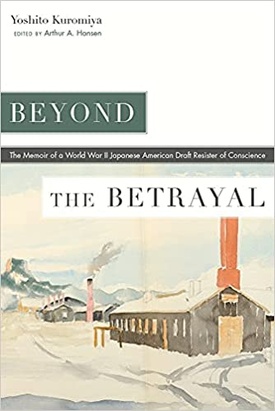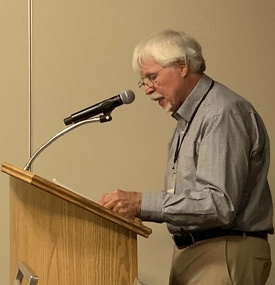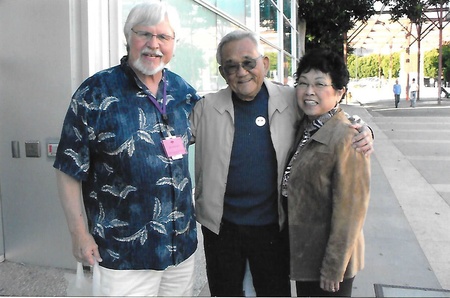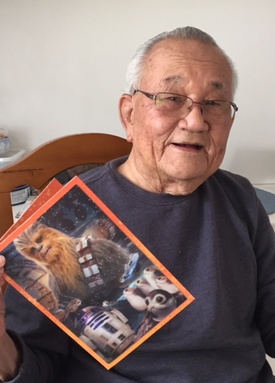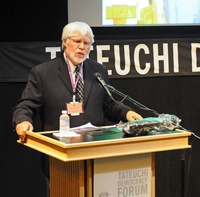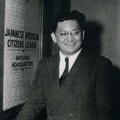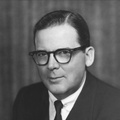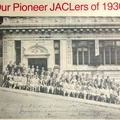On June 4, 2022, the Japanese American National Museum will host an event in celebration of the publication of Yoshito Kuromiya’s edited memoir, Beyond the Betrayal: The Memoir of a World War II Japanese American Draft Resister of Conscience. As one of the few firsthand accounts of the Heart Mountain Draft Resisters, Kuromiya’s memoir is an important text that documents the personal views of one of the famed resisters. Beyond the Betrayal’s editor and distinguished historian Art Hansen, along with famed Sansei poet Lawson Inada, will join the Kuromiya family in a conversation on Yosh Kuromiya’s life and the importance his memoir.
Art Hansen is, arguably, one of the most influential historians in Japanese American history. Originally born in Hoboken, New Jersey, Hansen spent his early life in the small town of Goleta, California. Originally a student of British and U.S. intellectual history at UC Santa Barbara, Hansen became invested in Japanese American history shortly after being hired as a professor at CSU Fullerton in 1965.
Having grown up with Japanese American classmates in Goleta and Santa Barbara that were incarcerated, Hansen found his interests renewed in the camps thanks to his colleague (and boon companion) Professor Kinji Yada. Yada, who spent his teenage years at Manzanar, shared his personal experiences of camp with Hansen, and inspired him to teach more on the camps, which was then a neglected topic.
Hansen became involved with the early Manzanar pilgrimages of the early 1970s, and befriended several activists such as Sue Kunitomi Embrey and Wilbur Sato during his visits. As part of his research into the camps, Hansen began interviewing several key figures from Manzanar, ranging from community leaders like Togo Tanaka, to Manzanar police officers like George Fukasawa (a fellow professor at Cal State Fullerton).
Perhaps his most well-known contribution to the field of Japanese American history is his leading work in oral history. In addition to managing his own work of teaching classes and advising students, Hansen started the Japanese American World War II Evacuation Oral History Project at Cal State Fullerton. Over the course of twenty years, Hansen and a team of academics and graduate students interviewed dozens of community leaders, government officials, and scientists involved in the incarceration experience. To this day, the project’s oral history collections remain important resources for scholars and activists interested in studying the wartime incarceration experience.
As a scholar trained in social, cultural, and intellectual history, Hansen always looked beyond the simple narratives of history. He was happy to interview neglected figures, such as the local community members of Lone Pine or the military police at Tule Lake, and never shied away from engaging in contentious topics, such as the Manzanar Riot of December 7, 1942. It was through his research of the Manzanar riot that he befriended the central figure of the riot, Harry Ueno. Along with interviewing Ueno and preserving his story through the book Manzanar Martyr (co-edited with Sue Kunitomi Embrey and Betty Mitson), Hansen remained a lifelong friend of Ueno throughout his years of activism and until the latter’s death in 2004.
In addition to Ueno, Hansen has famously ‘resurrected’ the stories of Japanese American dissidents. Perhaps besides Frank Chin, Eric Muller, and Frank Abe, no historian has gone so far as Hansen has to chronicle the actions of Japanese American dissidents that challenged the conventional narratives. Japanese American journalist Jimmie Omura entrusted Hansen with the manuscript of his memoirs, and Hansen later published Omura’s memoir as the edited volume Nisei Naysayer with Stanford University Press in 2018.
In addition to including Omura’s rich personal account of his storied career and support of the Heart Mountain Draft Resisters, Nisei Naysayer boasts contributions from noted playwright Frank Chin, journalist Frank Abe, and Yosh Kuromiya, a testament to both Omura’s influence, and the respect accorded to Hansen.
Like Nisei Naysayer, Beyond the Betrayal is both a memoir and edited volume. In addition to Kuromiya’s own words, Beyond the Betrayal includes an essay by historian Eric Muller, a poem by Lawson Inada dedicated to Kuromiya, and an epigraph by Frank Chin. Each of the contributions complement Kuromiya’s own narratives of resistance and consciousness during his triple imprisonment in Pomona and Heart Mountain concentration camp, and later McNeil Island Federal Penitentiary.
In the leadup for the June 4th event, I had the pleasure of interviewing Art Hansen about his experiences working with Kuromiya’s memoirs.
* * * * *
JVH: When did you first become acquainted with Yosh Kuromiya? What was your relationship like with him?
AH: I first met Yosh Kuromiya at a 1995 conference entitled “Remembering Heart Mountain” that was held at Northwest College in Powell, Wyoming. We hit it off immediately at this event, which included many former inmates at Heart Mountain, including Bill Hosokawa, the JACL leader who edited the Heart Mountain Sentinel, along with a contingent of 1944 draft resisters at that camp, such as prominent Fair Play Committee leader Frank Emi. The main speakers included Yuji Ichioka of UCLA and Roger Daniels of the University of Cincinnati. I presented a paper on Ben Kuroki, which was later published in my 2018 book Barbed Voices under the title of “Sergeant Ben Kuroki's Perilous 1944 'Home Mission': Contested Loyalty and Patriotism in the Japanese American Detention Centers.”
After that conference, I motored over to Grand Junction to the home of James Omura's oldest son, Dr. Gregg Omura, to pick up many boxes containing the documents that constituted the James Omura Papers, now housed in the Green Library at Stanford University. I mention this fact because Yosh Kuromiya and his wife Irene were very close friends of James Omura, who often stayed at their home during his research trips to southern California. It’s worth noting Yosh's laudation of Omura in Chapter 18 of Beyond the Betrayal, along with the photo of Yosh, his wife Irene, and James Omura on p. 146, in Beyond the Betrayal.
Over the many years spanning the 1995 Powell conference and the 2018 publication, I ran into Yosh and Irene Kuromiya, and they almost never failed to ask me, even in large public gatherings, when I would ever finish my in-progress book Nisei Naysayer. I was on several panels with Yosh over the years, and he always impressed me as the most thoughtful and eloquent of the numerous draft resisters, at Heart Mountain and other WRA camps, that I met. I got to know him, as well as Frank Emi, exceedingly well.
Then about five years prior to Yosh's death in 2018, I received an email from him saying that he had written his memoir, largely for his family members and close friends, and asked me if I, along with several others, such as the journalist Martha Nakagawa, an expert on the draft resister experience, would read it an provide it with my candid appraisal. I immediately responded to his request with a lengthy critique, both as to its content and from the perspective of a copy editor. I told him that, with selected changes, it should be submitted to one of two university presses for publication consideration. These presses were the University of Washington Press and the University Press of Colorado, which I recommended because both published books that targeted a readership consisting of academics and general readers. He thanked me for my critique.
JVH: And eventually, the manuscript was published with University Press of Colorado?
AH: Yes. And I am glad, both because of the strength of University Press of Colorado’s series on Asian American Studies, and their ability to reach a wider audience.
JVH: In your introduction to Beyond the Betrayal, you identify three key themes that you found in Yosh's memoir: the importance of “conscience,” “consciousness,” and the question of “constitutionality.” To you, do these words define the wartime incarceration?
AH: Each of them is of exceeding importance. I think that Yosh was exceptional among the other outspoken draft resisters with whom I became acquainted both in person and and/or their writings in terms of possessing greater consciousness. I do think, however, that most of the other resisters shared his acute sense of conscience and appreciation for constitutional rights, and this was particularly true of Fair Play Committee leaders Kiyoshi Okamoto and Paul Nakadate.
From my perspective, I feel that what made Yosh so “remarkable” in terms of these three defining themes, was that the second of them, conscience, was at a deciding discount with such otherwise estimable and powerful public figures of the World War II era as U.S. President Franklin Roosevelt, prominent newspaper columnist Walter Lippmann, and progressive California Governor Earl Warren, all of whom put their conscience on hold and supported the wholesale unjust removal and incarceration of 120,000 Americans of Japanese ancestry. That difference with Yosh is what made all the difference in the way in which the World War II experience of Japanese Americans was assessed.
JVH: In relation to more present-day events, I was struck by the friendship between Yosh and Iraq war resister Ehren Watada. What are some of the lessons from Yosh's story that can guide us during today's uncertain political climate?
AH: I think that at this juncture, when, both within our country and within the world at large, democracy and authoritarianism are waging a protracted battle for dominance, we need to pay heed to the heroic stories of role models like Yosh Kuromiya and Ehren Watada. When Eric Muller writes at the outset of his preface for Beyond the Betrayal, that “the book you are holding is an important document,” this sentiment should be interpreted within an enlarged frame of reference. To fail to do so, is to imperil the democratic way of life.
* * * * *
Join editor Arthur A. Hansen, a leading scholar of Japanese American history, and Lawson Fusao Inada, renowned poet, in conversation with Kuromiya’s family around the groundbreaking publication on June 4, 2022 from 2 p.m. to 3:30 p.m. PDT. This event will be offered both in person and virtual. For more information here.
Beyond the Betrayal: the Memoir of a WWII Japanese American Draft Resister of Conscience by Yoshito Kuromiya (1923–2018) is the only book-length memoir written by a World War II Japanese American draft resister of conscience,Yoshito Kuromiya. It is available in JANM store.
© 2022 Jonathan van Harmelen


